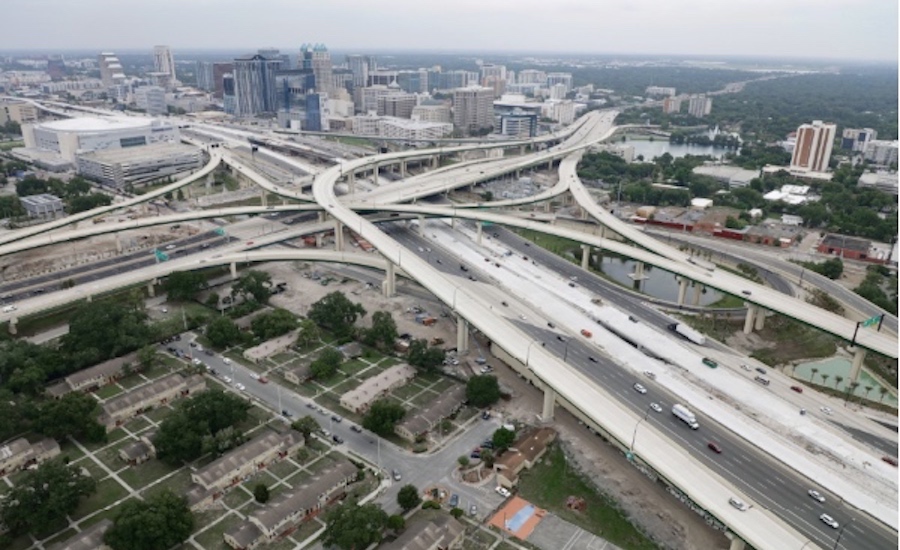Lane Construction Corp.’s negligence lawsuit seeking $132 million in damages from its Florida highway construction project joint-venture partner, Skanska USA Civil Southeast, will continue after a U.S. District Court judge in Orlando rejected on July 28 the defendant contractor’s motions to dismiss.
The Lane suit centers around the fact that Skanska was also a partner in the project's concessionaire team.
The January 2021 complaint filed by Lane—a member of the Skanska-Granite-Lane (SGL) joint venture leading the ongoing and much-delayed I-4 Ultimate project in Orlando—alleged that its building team will experience a “loss of significant magnitude” due to drilled-shaft design issues that added 245 days of owner-caused delays to the project.
According to Lane, that delay was more than the design-build agreement’s 180-day minimum triggering the joint-venture members’ ability to compel the I-4 Mobility Partners (I4MP) concessionaire team—which is 50% owned by Skanska—to terminate the project. In October 2018, Lane sent a letter urging its JV partners—including managing partner Skanska USA Civil Southeast—to demand that I4MP terminate the concession agreement.
Instead of terminating the concession agreement, however, Judge Roy B. Dalton Jr. stated in his decision that “defendant took the position that it was permitted to settle these issues as the managing partner, without the support of the other joint-venture partners.”
After negotiations with the Florida Dept. of Transportation concluded in October 2019, Skanska notified JV partners Lane and Granite of a proposed settlement that continued the project but included more funds for the partners. According to Lane’s original complaint, the added funding would still fall well short of covering the increased costs. Lane then formally asked Skanska to seek termination of the project with I4MP.
The judge described Lane’s lawsuit as alleging Skanska “was acting under a conflict of interest, given that I4MP is half-owned by defendant’s affiliate Skanska Concessionaire—and it and their joint parent company Skanska AB would suffer if the project were terminated.”
Summarizing more succinctly, Dalton wrote: “Essentially, plaintiff contends, defendant sacrificed the joint venture to ensure that Skanska would still profit overall.”
The judge continued, “With defendant’s refusal to ask I4MP to terminate the project, plaintiff and the joint venture are now stuck—to the tune of expected losses of nearly half a billion dollars.”
Skanska’s Arguments Rebuffed
In its motion to dismiss, Skanska argued that Lane failed to make a case for its claims of breach of fiduciary duty, gross negligence and declaratory judgment.
On each issue, Dalton sides with plaintiff Lane, including on the important claim of breach of fiduciary duty.
In countering Lane’s charges on this matter, Skanska argued that while the design-build agreement gives I4MP the right to terminate the project, the concession agreement does not.
To that argument, Dalton wrote that “this argument is fatally flawed for one key reason: the court has not seen the Concession agreement,” which was not included with Skanska’s motion to dismiss.
The judge added: “The Court cannot construe the parties’ complicated legal rights and relationships on the basis of incomplete information—a fact that defendant’s repeated references to the provisions of the (absent) Concession agreement should have become clear to defendant in the drafting of the motion to dismiss.”
Additionally, the judge argued that Skanska’s motion to dismiss “wholly misconstrues” Lane’s position.
“Plaintiff contends not that the joint venture had the right under the design-build agreement to terminate the project, but that it had the right to demand that I4MP enforce its rights under the Concession Agreement—including termination—to benefit the joint venture,” Dalton said.
Completion of the 21-mile-long reconstruction of Interstate 4 through Orlando is expected by the end of 2021. At that time, Lane’s complaint estimates, Skanska will require the JV partners to contribute $250 million in capital, including $75 million from Lane.
Contacted by ENR, both Lane and Skanska refused to comment on the ongoing litigation.





Post a comment to this article
Report Abusive Comment